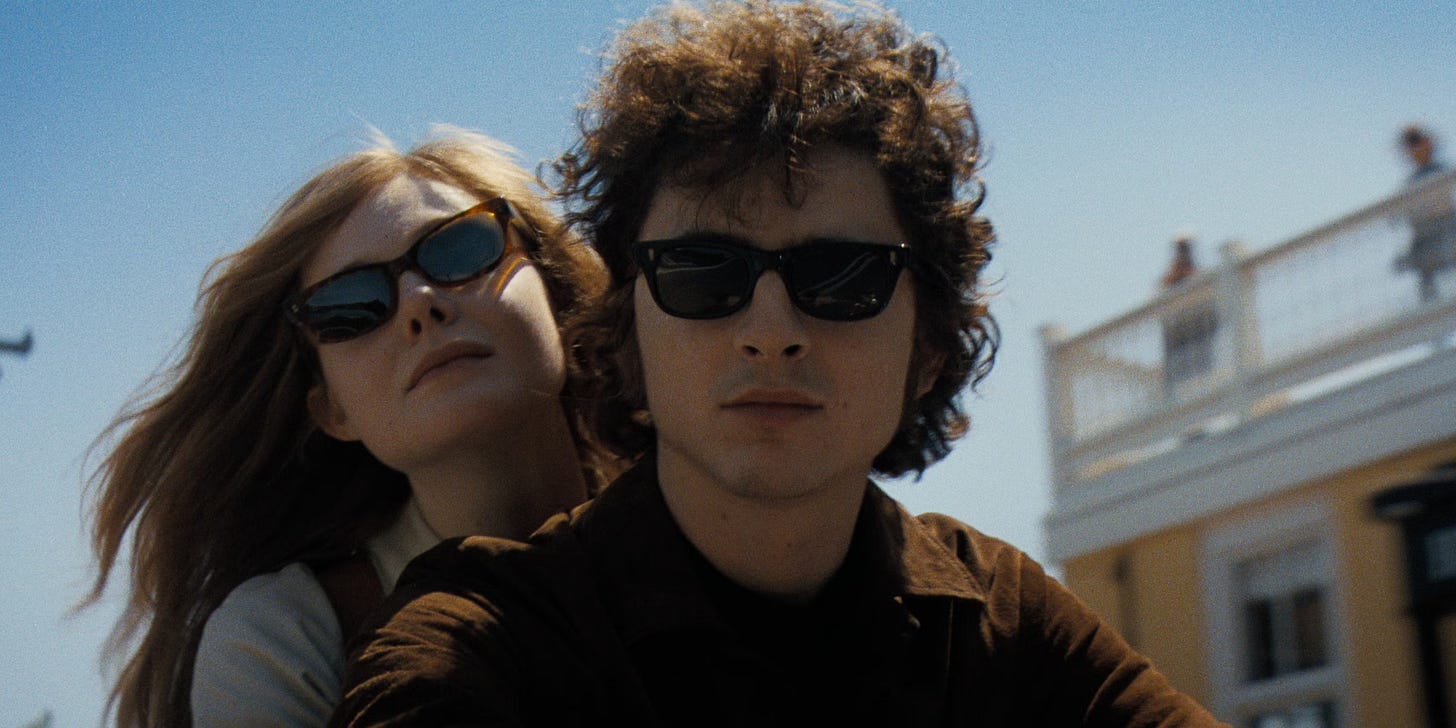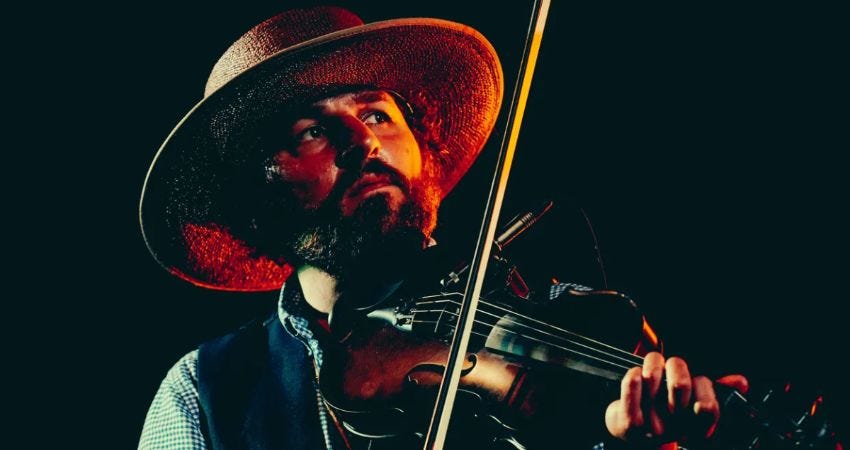There’s a line in the recent Bob Dylan biopic, A Complete Unknown, that caught my ear the first time around. The whole film (which, by the way, is really very good) teeters between two questions: what does it mean to know an artist, either as a audience member, or as a friend? And: how does folk music evolve? It is the latter of these questions that Elle Fanning’s Sylvie Russo address when she states ‘there was a time when the old songs were new’.
It’s an idea that I’ve been percolating on for as long as Folkroom has been running, and one that is closely tied to the way we define folk music. Is it a genre, recognisable by the sounds and playing techniques alone, or is it a storytelling tradition, for which the most important property must be the content of the lyrics? What they say. Who they say it to.
Bob Dylan has long been the most famous case study for this question, and his choice to veer into an electric sound is a focal point of the film. It’s interesting to lay modern eyes upon the sheer anger that was unleashed upon the man for the grand crime of: plugging in his guitar. Nowadays we tend to have a much more fluid idea of genre. Taylor Swift released two folk albums, and little fuss was made about whether or not they really belonged to the genre. Beyoncé released a country album and the world as a whole dived in without thinking twice.1
I’ve long settled on seeing folk as a living tradition. The stories are what matters. Who tells them and what they sound like matters less - as long as people can take the songs and make them their own.
Whether or not a song develops a life beyond the original artist is another thing entirely. There is little one can do to control it, besides getting their music out into the world at every possible opportunity and hoping that something, somewhere sticks. There are songs I’ve seen performed at Folkroom gigs over the years that felt to me as though they could have been the next great folk standard. Kitty Macfarlane’s ‘Wrecking Days’ is one - as, indeed, are almost all the other tracks on her sublime debut, Namer of Clouds. I first heard the Canadian singer-songwriter Camille Deléan sing ‘Tomorrow I Will Leave’ acapella in a crowded London pub. It still sounds like the sort of song that would be as suited to Frank Sinatra as it would to Rhiannon Giddens.
Sometimes I’ve seen these songs start to make an impact, however small it might initially be. There’s a small, perfect pleasure in seeing the song of one friend performed by another in a room full of strangers. Here’s a good song, they’re saying. It’s not mine, I just want you to hear it. That’s how folk music begins. In 2019, the legendary Irish songwriter Christy Moore recorded ‘Ringing That Bell’, a track originally by Rob Corcoran. One that I had first heard at one of Folkroom’s gigs in the basement of a London pub. Rob’s a fantastic songwriter, and here was an artist with real influence championing him. That’s how folk music grows. That’s how it lives.
We all have a part to play in this process, whether we are internationally renowned recording artists, or amateur gig promoters, or the audience facing the artists and asking to be entertained. It is easy - so, so easy - to opt for the familiar every time. The songs that made us famous, the acts that guarantee a sold out gig, the headliner we’ve seen six times before because they’re always a good time. But for folk music to live, we need to keep seeking out the new artists, and the new songs that we hope might someday become ‘the old songs’.
Sophie Jamieson is the perfect example of an artist sitting on the edge of modern folk. She’s a woman with a guitar, telling stories. But the guitar is electric, the stories personal, and frequently very sad. I’ve watched her from the near beginning, writing, performing, getting better and better - both at knowing who she is as an artist, and at writing songs that take hold and do not let go.
This month she joins us in Nottingham (readers can also catch her at non-Folkroom events in London, Brighton, and all sorts of other places as she tours her new album, I still want to share, which came out on Bella Union three weeks ago). Mojo magazine recently compared her to Joni Mitchell and Karen Carpenter in a four star review. She shares irrefutable qualities with Sharon von Etten and Marika Hackman, too, both of whom are fans. But she is also - and this is the critical thing - someone completely new, completely fresh. Or at least as much as anyone can be when they’ve been quietly honing their craft over the course of a half-lived life.
Joni and Karen and Sharon and Marika were new and fresh once. So, too, was Christy Moore, Bob Dylan. I’m not claiming Sophie will be any of those artists to you - but she could be something else. And you won’t know until you see her play.
Sophie Jamieson joins us at Peggy’s Skylight in Nottingham on February 16th. Tickets are available here.
Chris Wood is one of Britain’s biggest contributors to the new folk canon. I first worked with him at our first Brighton & Hove Folk Festival in 2021, and was struck by how timeless his music felt, even when it was tied specifically to distinct moments in time (‘Hollow Point’, perhaps his most powerful song, sounds like a traditional folk song but dissects the police shooting of Jean Charles de Menezes at Stockwell underground station in 2005).
I’ve been waiting for a chance to work with Chris again ever since his headline slot at our short-lived festival. This March 16th, he’ll join us at Peggy’s Skylight for a gig that’s already sold around two thirds of the tickets. If you aren’t amongst those already prepared for this gig, you can get your tickets here.
Talking of returning artists that I’ve been wanting to work with again for several years: I’m thrilled to say that Folkroom will be hosting the magnificent Gaelynn Lea for three gigs across London, Brighton and Nottingham this May.
Gaelynn first played Brighton for us in our much-missed Toy Museum series, before joining us in the midst of the pandemic for the live-streamed Pillow Fort Folk Festival. This will be her first tour of the UK since 2019, and we’re honoured that she’s chosen to include three gigs with Folkroom in this run. We’ll be announcing the gigs properly next week - this is just an exclusive sneak peek to give our newsletter readers a chance to get in early. Keep an eye out for more news via our Instagram next week!
Finally, Liverpudlian fiddle player Mikey Kenney will be joining us in Nottingham this April. I caught Mikey live a couple of years back and immediately fell for both his deft musicianship and his onstage charm. Mikey plays Peggy’s Skylight on April 20th, and you can get your tickets here.
That’s all for February - we’ll be back in your inbox in early March with more info on that Gaelynn Lea tour, another folk great joining us in Nottingham, and news on the latest release on the Folkroom record label!
The Country Music Awards completely ignored the album’s existence, but that’s more a story of the Country Music Association’s long history of overlooking black women in music than it is one of genre. Last weekend the Grammys were more kind, acknowledging the ground-breaking nature of the record and giving it Album of the Year over the most immediate pleasures of the Chappel Roan and Sabrina Carpenter LPs it was up against.









